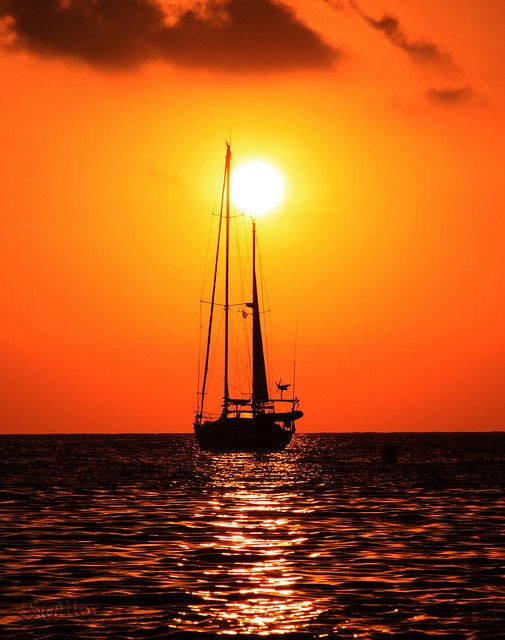《更多的诗歌》:46: 比斯开海岸
《更多的诗歌》
XLVI
第四十六首
比斯开海岸
The Land of Biscay
英国 A. E. 豪斯曼原著
Alfred Edward Housman (1859 – 1936)
徐家祯翻译

Hearken, landsmen, hearken, seamen,
to the tale of grief and me
Looking from the land of Biscay
on the waters of the sea.
Looking from the land of Biscay
over Ocean to the sky
On the far-beholding foreland
paced at even grief and I.
There, as warm the west was burning
and the east uncoloured cold,
Down the waterway of sunset
drove to shore a ship of gold.
Gold of mast and gold of cordage,
gold of sail to sight was she,
And she glassed her ensign golden
in the waters of the sea.
Oh, said I, my friend and lover,
take we now that ship and sail
Outward in the ebb of hues and
steer upon the sunset trail;
Leave the night to fall behind us
and the clouding countries leave:
Help for you and me is yonder,
in a haven west of eve.
Under hill she neared the harbour,
till the gazer could behold
On the golden deck the steersman
standing at the helm of gold,
Man and ship and sky and water
burning in a single flame;
And the mariner of Ocean,
he was calling as he came:
From the highway of the sunset
he was shouting on the sea,
„Landsman of the land of Biscay,
Have you help for grief and me?”
When I heard I did not answer,
I stood mute and shook my head:
Son of earth and son of Ocean,
much we thought and nothing said.
Grief and I abode the nightfall,
to the sunset grief and he
Turned them from the land of Biscay
on the waters of the sea.

听呀,陆上和海上的人们,
请听忧伤与我的故事,
从比斯开海岸
向大海的水域凝视。
从比斯开海岸,
越过大洋眺望天空,
在极目远望的海角,
忧伤与我在黄昏步履从容。
在那儿,燃烧着的西边风娇日暖,
昏蒙的东边却天寒地冻。
在落日照耀的水上,
一艘黄金的船朝着海岸移动。
船上有金色的船帆和金色的绳索,
还有一根金色的桅杆高耸。
船上挂着金色的国旗,
其倒影清晰地映在海中。
喔,我说,我的朋友和爱人,
让我们现在就驾船远航,
朝着光线隐退的方向,
顺着夕阳的轨迹乘风破浪;
让黑夜在我们身后降落,
离开阴云密布的家乡:
在那里你我都有更好的前景,
黄昏在西方能找到避风港。
山脚下帆船驶近了港口, 直至人们可以清楚地看见: 在金色的甲板上, 舵手站在金色的舵轮面前, 人、船、海和天, 都被一束光焰点燃。 船上有位水手, 等船一路进来他一路大喊, 顺着夕阳照射的光线, 他的喊声从海上传到这边: “比斯开海岸的人们呀, 谁能帮忧伤与我解决困难?”
我听见了他的话,却没回答,
我摇着头,沉默无言:
大地之子和海洋之子,
我们想得很多,却闭口不谈。
忧伤与我一直待到夜幕低垂,
忧伤和他离开了比斯开海岸,
朝着夕阳西下的方向,
行驶在大海的水域上面。
二 0 二二年五月三十一日
译于澳大利亚刻来佛寺爱闲堂
* 豪斯曼的这首诗是诗集《更多的诗歌》中的第 46 首。
这首诗中,诗人用讲故事的形式告诉读者,忧伤是永远与人们在一起的。人们 想要逃脱忧伤,那是不可能的事。有时候,人们会幻想,是否别的地方的人们没有忧 伤,生活得比我们这里好一些,最终,他们会发现,其实,世界上每个地方都存在忧 伤,到东到西都相差无几。
这首诗的第一段是序诗,仅四句。一开头就告诉读者,要讲的是“忧伤与我的故 事”。在诗的第三节中,诗人又称“忧伤”为“我的朋友和爱人”。可见,忧伤永远与人在 一起,不可分离。
诗的一开头,诗人还指明了听故事的对象:“陆上和海上的人们”,其实,就包 括了世界上所有的人们。
诗的第二节说,当忧伤和“我”在海角漫步的时候,看见从西方驶来一条黄金的 船。于是,在诗的第三节,“我”就对“忧伤”说了一段话,希望能与忧伤离开“阴云密布 的家乡”,乘坐这条金船,向夕阳沉没的地方去寻找更好的生活。“我”认为在西方能找 到“避风港”。
诗的第四节说,等黄金的船只驶近时,忧伤和“我”听到船上有位船员在向陆上 的人们喊话,问他们:“谁能帮忧伤和我解决困难?”于是,“我”就忽然明白:以为黄 金船上没有“忧伤”,只是一个虚幻的梦想而已,其实忧伤到处都存在。所以,在诗的 第五节中,诗人说:“我听见了他的话,却没回答,我摇着头,沉默无言。”诗的最后, 忧伤和“我”还是留在了陆地上,而忧伤和“他”也还是驶向落日的方向:现实并没有一 丝改变。
比斯开海湾(the Bay of Biscay)是在西班牙北部、法国西部的一个海湾。
原诗五节,每节句数不一。译诗每节双句押一韵。
